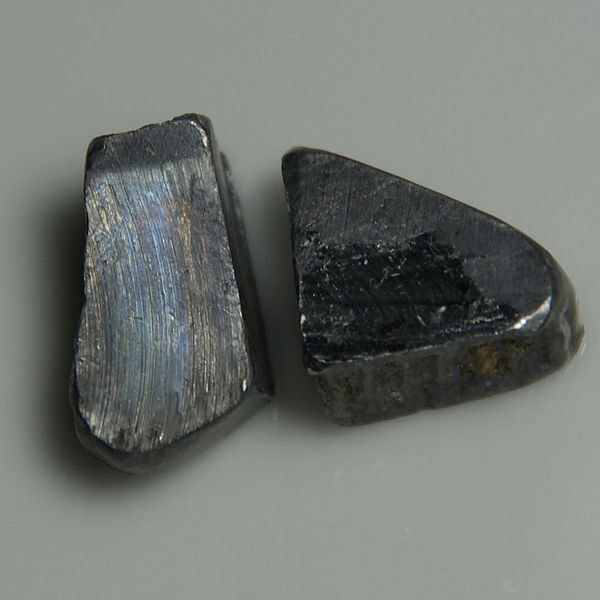A withdrawn and mistrustful teenager was helped enormously with the homeopathic remedy Plumbum metallicum. He has the typical personality traits and clinical indications of the remedy. The case highlights how a state can be transferred between people: the father had been in a prolonged state of stress during his career, where several of his peers were attempting to sabotage and conspire against him, due to which he had to remain constantly vigilant. This was taken into consideration when a metal is chosen during remedy selection.
Homeopathic remedies are made from a surprising number of substances
For more than 200 years, natural substances with medicinal properties have been turned into homeopathic remedies especially herbs, nuts, fungi, seeds, flowers, legumes and the bark of trees. Many plants in the garden have found their way into the Materia Medica. As well as this, the minerals, metals, gemstones and rocks are listed. In fact most of the elements on the periodic table are there, right the way from Calcium, Silica, Sulphur through to Lead and
Gold. There are now over
8,661 homeopathic medicines listed globally.
Materia medica (lit.: 'medical material/substance') is a Latin term from the history of pharmacy for the body of collected knowledge about the therapeutic properties of any substance.
The
Materia Medica of a homeopathic medicine/ remedy will describe the whole person, including personality, mental and physical symptoms, tendencies, food desires and even how people are affected by the weather. Since all people are unique, descriptions of the homeopathic remedies also include many individual differences.
It is known that people requiring a remedy from the plant kingdom have
different qualities to people requiring a remedy made from a metal or mineral. Patients needing plant remedies have the fundamental issue of sensitivity. With remedies from the mineral kingdom the themes are of structure, relationships and performance.
It's all about performance and competition: Homeopathic remedies made from metals
People who require a Homeopathic remedy made from a metal will place importance on their field of work, often in preference to other parts of their life. Performance, getting things done and competition are natural attributes of such personalities. They need to know that they are ahead and holding positions of responsibility and power. This is evident in adult patients due to their structured and authoritative speech and occupation, while in children and infants more subtle observations may be required.
Most metals are either highly ductile or malleable, or both. Such features make them very valuable in industrial applications. In terms of homeopathic expression, these properties may be translated as individuals with a high ability to absorb pressure, with an inherent capacity to adapt to high demands at their work place without becoming flustered. That is also why they are naturally selected for positions of leadership or positions that are highly skilled and valued. This is the kind of situation that such people learn to deal with at a very early age and with comparative ease.
"He would just stare at me with a grim face": A case history requiring a metal remedy
Case history written by Dr Sunil Anand.
This is the case of a fourteen-year-old boy with the chronic complaint: spina bifida occulta. The initial part of the interview was spent talking to him alone. What struck me at the very first glance was how guarded he appeared with his replies. He would just stare at me with a grim face, and then answer in minimal sentences.
What are his hobbies and abilities? He came in holding a Rubik’s Cube from the waiting room. He had almost solved it, and so I thought it best to go with the flow and requested him to complete it if he liked. He appeared relaxed, but suddenly he was totally focused on that activity. I did not time him, but he completed it at an amazing speed and placed it on the table. There was no obvious sign of victory, not even when I congratulated him on his accomplishment. He seemed confident. It was clear that he was used to such high-pressure tasks and did not feel the need to glorify them. The staring game resumed! I asked him more about the cube, as I sensed that there could be resistance if I attempted to probe the medical history too early.

He said that he liked to solve cubes and commented that this was an easy cube, while he was used to solving more advanced ones. On being asked about his other interests, he said that he liked all kinds of sport but soccer was his passion. I had read his case form and had noted that he had bladder incontinence, and wondered how he could cope playing a demanding physical sport such as soccer with such an ailment, but decided to understand him more first.
He had made a nice sketch of a racing car on the creative page of the case form, and when asked about it, he said that it was a NASCAR, which was driven on specific tracks that were different from Formula One. He liked to collect such car figures, and said that he is waiting for the time when he would be able to have his learner’s license and be able to drive a four-wheeler.
He was doing very well academically as well. He craved French fries. As his body language indicated that he was now a bit more relaxed, I asked him about his medical issues. He said that he had none! I knew that he had spina bifida, so gently asked him if that was affecting his life in any way? He said no. The staring game resumed.
The parent’s view: Due to the boy’s considerable resistance, I thought it best to interview the parents at this stage. This is what they had to contribute regarding the boy and his medical and personal history.
The father is a young officer who has taken recent early retirement from the services and now works as a research consultant. The mother is currently a housewife due to the health challenges of the children.
Treatment so far: “He was diagnosed with congenital spina bifida and operated on at eight months of age. He is on Tropan, a drug for neurogenic bladder that reduces reflux, but it has not proven very effective in keeping a check on his bladder incontinence. It is known to have adverse side effects so we are looking at alternative forms of treatment. He has come to you quite reluctantly, as he does not like to discuss his medical issues with others. Also he feels he is capable of taking care of it without anyone’s help. But every time we try to wean him off Tropan, he gets a severe bladder infection with high fever, which is controlled only with strong antibiotics. This affects his stamina and hence we have convinced him to start homeopathic treatment. The uro-surgeons have varying opinions. Some are of the view that he should undergo additional surgery. Others feel that will not be of much use as the last surgery resulted in tethering of his spinal nerves and a repeat surgery could cause further damage.”
Impact on bladder and rectum: “He has been suggested self-catheterisation three times a day, and he makes it a point to do so, and definitely before a soccer match as well, as that is a big motivating factor for him. “He also has poor rectal control but it does not affect him too much as he is mostly constipated. He indulges in a lot of physical activity and also has a high level of academic competence. Psychologically, he seems to be managing very well, as he is very independent and confident and very appreciated and respected by his peers and teachers. So even while his friends may know about his ailment, they dare not laugh at his handicap. He knows how to deal with difficult situations and rallies people around him.”
Psyche: “He used to be a very sweet child but since the last two years we find his behaviour more aggressive. His younger sister is under treatment for psychosis and he has become very intolerant when she gets aggressive.” His sister was not under my treatment at that time, but once they saw their son responding, she also commenced homeopathic treatment and responded well to Ignatia. “He does everything in his own time and becomes aggressive if repeatedly told to finish an incomplete task. We have also noticed that recently he takes a lot of time answering when asked something, (I had noticed this as well) and that causes difficulty for others to communicate with him. While he has several friends and admirers, he hardly has any close friends. But he seems content with that. It only bothers us.” The mother was with her parents during his pregnancy as her husband was posted elsewhere. She did not take folic acid very regularly, until she had bleeding at thirteen weeks, and then started to take it more diligently.
The father on his career: “I have over a hundred publications in my name. There were a lot of pressures as I needed to be away from work for long periods and I also needed to travel a lot. I have retired as now I want better opportunities for my kids and want to provide a good support system to them by being around for them.
“Our son was conceived during the initial years of my career and there was a lot of academic pressure. I had to show very high performance but I found that period of my life and career very satisfying. I was the main driving force of my team within the naval officers; beyond a point I don’t take too much stress, however high the pressure. I get things initiated and then monitor them from the outside. Though my team has always been co-operative and most of my mentors have also been very supportive, I needed to prove myself. At that time there was resistance at the mid-level, as I was very young and yet had to lead my team, and that created issues at the lower level. Some of the officers tried to sabotage my reputation and I was being watched, and hence I always had to watch my back and make sure that I did not violate procedures in any way. These officers were waiting for me to make a slight mistake, but I never gave them a chance to find fault in my work.”
At this point, the boy was called into the clinic once again and was asked about his constipation. He replied that his stools were always hard and dry, and needed a lot of straining. He would skip days at a time, during which he would get very severe stomach ache.
Analysis and the main themes of this case
• Serious – both from the pathology point of view and also devoid of humour
•Spinal involvement resulting in paresis
•Bladder incontinence due to neurological damage
•Silent assertion of leadership
•Lack of empathy (towards sibling)
•Conspiracy (seen in the father’s work environment)
•Dry hard stools causing stomach cramps
It is decided to prescribe him a remedy which is a metal. Plumbum which is the remedy made from lead, fits the bill. What is Plumbum metallicum used for? The cold hard stare of a patient who needs
Plumbum metallicum can be very imposing and intimidating. One gets the feeling of mistrust and of being watched and sized up. They are often in situations themselves where their power or leadership is under threat, and they have the ability to absorb such intense pressure or competition.
Even the boy’s capacity of proving himself in whatever he does, whether it is his interest for specialised cars, advanced Rubik's cubes, or while playing competitive soccer, reflects his need to shine. His need is to appear indispensable due to his special skills, and the need to be valued despite his handicaps.
Plumbum metallicum constipation is often discussed in homeopathic Materia Medica
His curt replies, even during acutes, is very characteristic of the Plumbum metallicum personality. There were occasions of bladder infections with high fever and he would reluctantly visit the clinic and refuse to say anything. He seemed more upset that we had disturbed him from preparing for an important exam than about his ailment. When asked what is happening, he would often say: “I am fine, there is nothing wrong with me.” When one checks the rubric “Well, says he is, when very sick,” Plumbum figures as one of the remedies.
So he is given Plumbum in dilution at frequent intervals until the fever and infection settle down. As he started to witness the power of the remedy at such times. The fact that antibiotics were no longer required, made him look at homeopathy with more respect, though his diffident attitude still persisted. And once the bladder incontinence and constipation also started to improve, his confidence in the treatment grew stronger.
He started to act as a normal teenager, and asked me to suggest to his father that he needed to take extra protein powder as a supplement to increase his weight and muscle mass, which his father – rightly so – was against. He was worried about his acne, and wanted to increase his height and look good!
I managed to dissuade him from taking protein powder, while explaining to him the adverse effect it would have on his already weakened system, and with an assurance that his ongoing homeopathic treatment would address that as well. And he actually listened and agreed!
Follow-up after six months: Soon we were able to stop the use of self-catheterisation as well as the Tropan. After a period of about six months there was also no need for diaper use, much to the boy’s relief, though he never openly acknowledged that. His self-pride and independence were very important to him. The other extreme is intense despair with a feeling of failure and fear of letting down others, which translates into suicidal impulses.
Even the uro-dynamic tests confirmed that his bladder residual is much better, and he has not had a urinary infection. He is on no other medication except homeopathy. In a recent follow up in 2020, the teenager has been doing well without any incontinence issues at all. The case highlights how a state can be transferred between people: the father had been in a prolonged state of stress during his career, where several of his peers were attempting to sabotage and conspire against him, due to which he had to remain constantly vigilant. This was taken into consideration during remedy selection for his son.
Signs and symptoms of Spina bifida
Spina bifida is a spinal cord defect. The defect arises between the 22nd and 28th day of embryonic development, which is the period of primary neurulation, when the neural tube is formed from the neural plate and closed. In spina bifida the defect is usually at the lower end.
Spina bifida affects on average one in 1000 children, with girls affected slightly more often than boys.
Depending on the severity of the deformity – that is, the degree of damage to the spinal cord – people can suffer anything from slight to severe physical disability. Problems walking to paralysis of the legs and reduced or completely absent sensitivity are possible (paraplegia). Control of the bowel and bladder is frequently limited or absent. The key factor is the height at which the defect occurs in the spinal cord and the degree of impairment to the nerves.
=========================================================
Thank you to Dr Sunil Anand for permission to present this edited version of the case which first appeared in full in Gold Series: The sixth row of the periodic table. Spectrum Journal #1, 2018 pages 36 to 45.

Sunil Anand (L.C.E.H, M.R.C.H, Homeopath, HOM) is a leading practitioner and teacher who has practiced homoeopathy for 35 years and is recognised for his treatment of pediatric cases. His use of simple tools such as toys and games for children, as well as the enquiry into doodles and drawings, provide wonderful insights into cases with very deep pathologies. His seminars and workshops have been widely attended in India and other countries.
Having graduated from the C.M.P Homeopathic Medical College, Mumbai (L.C.E.H. in 1981) he then pursued his post-graduation from the Hahnemann Post-Graduate Institute of Homeopathy U.K.(M.R.C.H. in 1984). He is also a Registrant of the College of Homeopaths of Ontario (Homeopath, HOM).
sranand1960@gmail.com
www.amarawellness.ca
Since you're here...
More people than ever before are reading the Aurum Project blog. There is currently a surge of interest in natural therapies research. If you want to find out more about the latest cutting-edge natural medicine research and homeopathy news from Australia and the world, sign up to our newsletter. You won’t regret it. It will only take a minute. Thank you.
Click here to subscribe today.



 Sunil Anand (L.C.E.H, M.R.C.H, Homeopath, HOM) is a leading practitioner and teacher who has practiced homoeopathy for 35 years and is recognised for his treatment of pediatric cases. His use of simple tools such as toys and games for children, as well as the enquiry into doodles and drawings, provide wonderful insights into cases with very deep pathologies. His seminars and workshops have been widely attended in India and other countries.
Sunil Anand (L.C.E.H, M.R.C.H, Homeopath, HOM) is a leading practitioner and teacher who has practiced homoeopathy for 35 years and is recognised for his treatment of pediatric cases. His use of simple tools such as toys and games for children, as well as the enquiry into doodles and drawings, provide wonderful insights into cases with very deep pathologies. His seminars and workshops have been widely attended in India and other countries.